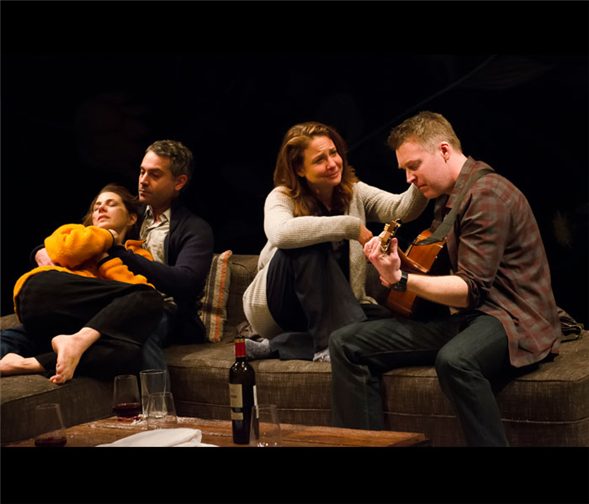Translate Page

Sarah Ruhl's new play chews through polite behavior
---
Even before the bird shows up, there are animals all over How to Transcend a Happy Marriage.
In fact, the moment we enter the Mitzi E. Newhouse Theater, where Lincoln Center Theater is currently presenting Sarah Ruhl's new play, we see a massive goat carcass hanging in an otherwise orderly suburban living room. It creates an instant sense of wildness – a suggestion that something in the building is running loose.
Then the play begins, and things really break open. Two polite couples are having a dinner party with three almost-strangers who are in a polyamorous relationship together. The young woman in this triad, Pip, stalks and kills her own meat, which gets everyone talking about the allure of hunting, of flesh. Soon enough, alcohol is flowing, inhibitions are lowering, and everyone is in a lusty pile.
That's hardly the end: The rest of the play tracks what this night unleashes in the characters, be it physical, spiritual, or slightly magical. Even as the story gets more extreme, however, the play stays rooted in something real. Because haven't we all felt the animal inside? Haven't we all felt tugged, once in a while, to see what happens if we chew threw the constraints of civilized behavior?
"From the starting gun of the play, [our characters] are courting instability without knowing it," says Robin Weigert. She plays Jane, a perfectly respectable attorney who's hosting the dinner party with her husband Michael (Brian Hutchison), a jingle writer. "There is something driving us that isn't conscious. It's not cerebral. Even though it's manifested with a lot of witty banter and repartee in the first scene, what's rising up through us is something we don't actually have control over."
She notes that Jane talks less and less as she's overcome with new awareness. Eventually, as the consequences of her actions fracture her relationship with her daughter, she condenses her perspective into a single, piercing observation: you have to become an animal to have a child, and then you spend the rest of your life disguising you animal nature.
{Image1}
For Hutchison, that's a key insight. "It's a description of what is expected of human beings," he says. "When can't be animals out in the open because there are so many restrictions and social morays against it. So it's kind of brilliant that [Sarah Ruhl] has us walk in and just a see a goat hanging in the room. You can't ignore that."
But how do actors become feral on stage? After all, even when they're going ballistic, they still have lines to say and exits to make. For Hutchison, crafting his performance means remembering to "play the positive" as each new experience comes roaring toward him. "There's not enough time to resist," he says. "The scene has to roll forward as if we are interested in these people who we know nothing about. It would be easy to pull back and judge, but it's about putting a positive spin on it. We're intrigued by these people, and that's what moves us forward, even when it's awkward."
By rolling with what's happening, that cast can also avoid getting hung up on the play's mysteries. At one point, for instance, it seems that one of the characters has turned into a bird, and eventually an actual bird makes its way on stage. For Weigert, it's more interesting not to decide if this bird is literally the character from before. "What I like a lot about Sarah's writing is that there's an openness," she says. "A lot of plays try to answer things. Her plays try to raise questions."
And the questions are trickier because that real-life bird swoops in. As Weigert says,"If you just heard about someone becoming a bird, then you could sit quite comfortably with it and say, 'The bird is a metaphor.' You could sort of find a place for it and not have to deal with it in any kind of literal sense. That would actually take some layers away from whatever line of questioning might get going in you. But when the bird is there, it changes your lens on the play. 'What is this? What do I make of this?' You have to ask yourself that."
---
TDF MEMBERS: At press time, discount tickets were available for How to Transcend a Happy Marriage. Go here to browse our latest offers.
Follow TDF Stages editor Mark Blankenship at @IAmBlankenship. Follow TDF at @TDFNYC.
Photos by Kyle Froman. Top photo (L to R): Marisa Tomei, Omar Metwally, Robin Weigert, and Brian Hutchison.